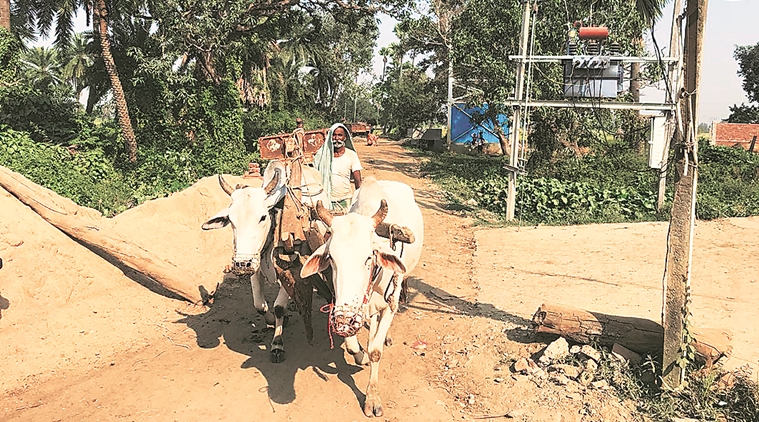A Bhagalpur village that has seen 20 deaths since 1991 over electricity poles is willing to put rivalry aside for ‘development’
Around 10 km from Bhagalpur city, the Yadav-dominated twin village of Koyli-Khutaha is affluent by usual standards. Houses are mostly all pucca, motorcycles and SUVs are parked outside many of them, and several bikes bear the blue and red colour number plates used by Bihar Police personnel. But this affluence stops at the door steps: overflowing drains, the absence of a health centre and proper school, and a bank or even an ATM, mark the two hamlets of over 10,000 people, which have hundreds in the Army and police.
There is one aspect though in which Koyli-Khutaha’s story is distinct from other Bihar villages. In April 1991, the two clashed over installation of electricity poles. In the 30 years since, violence over the issue, latest in 2019, has left 20 dead, and 27 sentenced to life.
That early summer day of 1991 is still vivid in the memory of most in the village. Officials had arrived to put up electricity poles near the railway halt, which fell on the Koyli side. Some people from Khutaha, four times the size of Koyli in numbers, crossed the nullah that still separates the two hamlets and carried the poles to their side. The poles were tracked, followed by a rumour that the people near whose houses these had been found would face long jail terms, says a Koyli resident. Some villagers from Khutaha beat up a few residents of the other side for helping the police.
Later, the clash escalated into a full-blown shootout. Gunshots could be heard all day, with a “scared” police keeping away. By evening, one Ranjit Yadav of Koyli was dead.
“With this began the bloody journey that casts its shadow till date,” says the resident, who doesn’t want to be named, and who spent over 14 years in jail after being convicted of three murders over the years.
Ranjit’s brother Pawan says, “The clash was like the Mahabharata, people from the same family on different sides.”
Four years later, three people from Khutaha were shot dead, followed by 16 more till 2005. Last year, another killing was linked to 1991.
However, realising that the fight had deprived them of power, around 2007, when Bihar saw an electrification drive under the first Nitish Kumar term, they decided to bury their differences.
In this election where a desire for jobs is an overwhelming demand, the hamlets seem to be again coming together. On both sides, youths complain about lack of vacancies, with the RJD promise of jobs clearly a winner.
The Koyli village school has four rooms, with one a store, and another an office, forcing students to share the remaining two. Karamvir Yadav of Khutaha says, “I cracked the Bihar Public Service Commission Exam in both 2018, 2019, as well as the written exam for sub-inspectors… The interviews are pending. The government must expedite hiring.”
The Yadav vote in the twin hamlets (Koyli falls in Nathanagar seat; Khutaha in Kahalgaon) has mostly stayed with the RJD. The JD(U) won Nathanagar last time on strength of the RJD as its ally. Its sitting MLA Laksmi Kant Mandal however is expecting a tough fight this time on account of the LJP candidate in the race (Amar Singh Kushwaha, who got over 50,000 votes in 2015). The RJD has put up Ali Ashraf Siddiqui. At Kahalgaon, the Mahagathbandhan candidate is the Congress’s Shubhanand Mukesh, the son of CLP leader Sadanand Singh, and the NDA’s is Pawan Kumar of the BJP.
Saying that the police have always been prompt in their response to incidents, Bhagalpur DIG Sujit Kumar says issues blow up when ego, caste and religion are attached to them. “When group mentality starts working, a small behaviour doesn’t remain small.”
Apart from the desire for development, ground for reconciliation has been prepared by the fact that many people accused in the original clash have moved, leaving behind a new generation. Take Subhash Yadav, who lives in Bhagalpur’s Vikramshila Colony, who says they regret that the matter dragged on for so long. “Development should not take a backseat due to past rivalry,” he adds.
Says Subhash’s son Aditya, 32, who contested a zilla parishad election, “Being divided, we could not come together for things like access to a road. (But) both sides now eat, celebrate together. It has to end somewhere.” He adds, “Nitish gave electricity but it was a natural process, as villages have to be electrified some day… Tejashwi is talking about jobs.”
Back in Koyli, Munni Lal agrees. Displaying the same impatience that Nitish is facing across the state, he says, “We waited years for bijli, doesn’t mean we should wait for everything.”
Source: Read Full Article


